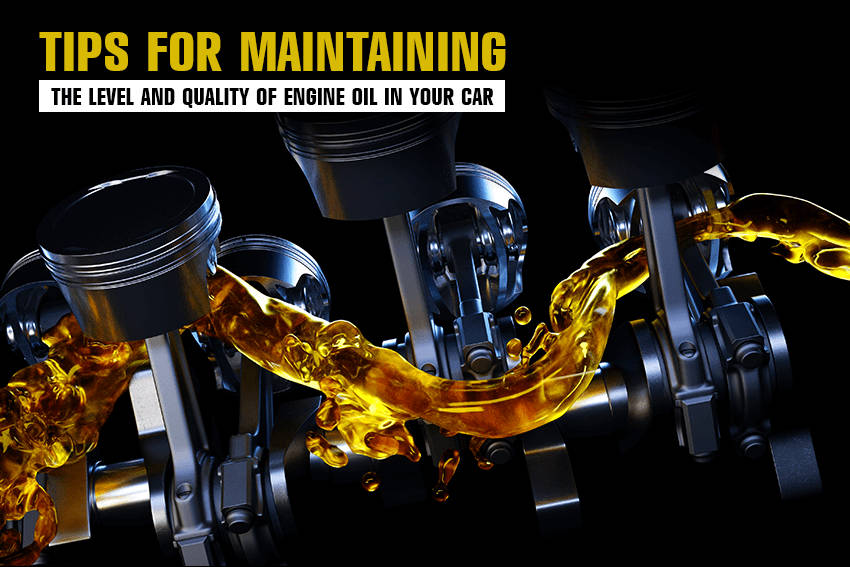Tips for Maintaining the Level and Quality of Engine Oil in Your Car

The life of the car depends heavily on its maintenance. If you take your car regularly to the service station, follows recommendations of the manufacturer, and pay special attention to the engine, you will sure to enjoy trouble free ownership experience. Among other things, you should pay special attention to the engine oil in your car – both its levels and its quality. The engine oil is responsible for the proper working of your car’s engine and you must be cognizant about its condition to ensure that your car suffers no mechanical damage. We explain in detail the concept of engine oil and what you should do to keep its levels maintained for your car’s proper functioning.
1) What is engine oil? The engine oil is essentially a petroleum product and derived from the crude oil in a process which results in the distillation of petrol and diesel fuels. However, engine oil is distilled at lower temperature when compared to petrol and diesel although the process of distillation resulting in all these byproducts remains the same. Now depending upon the base oil, one can classify engine oils into two categories: conventional engine oil and synthetic engine oil. While the former is derived directly from crude, latter has some special additives making it superior in quality and functional abilities than the former. Synthetic oils are costlier than conventional oils though they last longer and have better heat withstanding capacity than conventional oils.
2) What Engine oil does? A car’s engine is an aggregate of moving mechanical parts accomplishing various kinds of reciprocating and rotary motions. In order to accomplish both these kinds of movements, the proper lubrication of the moving parts is absolutely essentially. The engine oil accomplishes this task and helps in the proper functioning by providing proper lubrication to mechanical components of the engine. In addition, it also helps hydraulic actuators to perform optimally.
During the lubrication process, engine oil also removes heat from the various components; thereby keeping the engine’s operating temperature within prescribed limits. However, in this process of absorbing heat, engine oil tends to evaporate, and hence requires a replacement after a fixed interval of distance travelled by the car.
3) Replacement Interval: Different manufacturers have different recommendations when it comes to changing engine oil. Usually, companies recommend the engine oil change every 10,000 km/ 1 year (whichever is earlier). It’s a wise decision to follow the recommendations rather than making your own rules regarding the engine oil change. As mentioned before, engine oils tend to evaporate with the passage of time. The rate of evaporation will be more if you subject your car to abnormally high operating temperatures, drive long distances in a stretch, and put an extra burden on the car by loading it with excess weight. In such situations, the engine oil might not last the interval recommended by the brand and you might require replacement even before the next service due date.
You can also check the level of engine oil in your car manually. Make sure that the engine is switched off and is not running hot. Ideally, after an interval of 20-30 minutes once you turned the engine off, you should be checking engine oil. Open the bonnet of the car and locate the engine dipstick just in front of the engine. Pull out the dipstick, clean it thoroughly, and then again insert and pull it out to find the level of engine oil. The dipstick has two points marked on it and level of engine oil must be between these two levels. If you find any deviation from the desired level, you should immediately drive to the service center and top up the engine oil to the desired levels. Also, along with the engine oil levels pay close attention to the color and viscosity of the oil. If the oil has turned completely black and has lost its viscosity (take a drop between tip of two fingers and then find stickiness oil is left with), then again it’s an indication that the engine oil requires a change.
Some of the other Indicators that hint that you need to replenish the engine oil in your car include:
-
In case you notice a sharp decrease in the fuel efficiency of your car, it could possibly because of insufficient engine oil or the degraded quality of the engine oil.
-
If your car starts emitting white fumes in the morning then it’s definitely an indication that the time has come to get your car to the service center and checked it for engine oil degradation.
-
If you drive regularly in heavy start-stop traffic conditions, then your car’s engine oil is prone to evaporate earlier than the prescribed interval of 10,000 km. In such a scenario, it is recommended that you regularly check the level of engine oil manually after an interval of 7,000 km and if the situation demands get the engine oil changed even before the scheduled oil change.
-
Avoid overloading your car unnecessarily as the extra weight put additional loads on the engine which, in turn, heightens the operating temperature inside the engine; thereby accelerating the engine oil evaporation rate.
Remember, any negligence to maintain the level and quality of engine oil could prove a very expensive mistake on your part. The engine of the car might fail and various mechanical components could suffer irreparable damage. It is therefore recommended that you should take quality care of the engine oil that will help you to achieve a longer, trouble-free ownership experience for your car.
Also Read:- Synthetic Oil Vs. Conventional Oil: Which One You Should Go For?